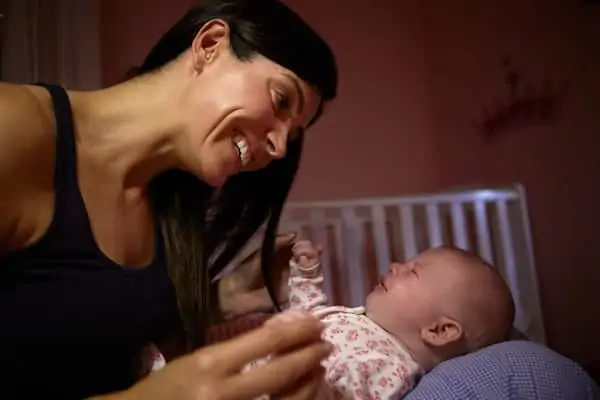Babies definitely make you question your sanity. The minute they do something like arching their back while breastfeeding, you wonder if you’re doing something wrong or if they’re trying to tell you something.
Thankfully, there are several reasons that your baby is arching back while breastfeeding. Some of them are quite normal, while others will need further investigation. Let’s look into it all, shall we?
Why is my baby arching her back while breastfeeding?
There are a few minor reasons why she might be doing this.
- Baby is trying to tell you something
As you’re well aware, babies can’t talk. So when they’re annoyed or bothered, they will show you in physical ways. Often, when your baby is arching back and refusing to feed, she’s trying to tell you something is bothering her. Generally, if you check the diaper, reposition, and all those other simple tricks, she will stop arching her back. It’s usually something very simple.
- Baby has colic

Colic is such a pain. The digestive issues babies have are largely due to their developing systems. But colic is very familiar, and if your baby is growing and gaining weight, there’s generally little cause for concern. It will be a rough few months for you if your baby is colicky. However, that usually clears up on its own around 3 to 4 months.
- It’s reflux
With a baby that arches and cries immediately after your feeding, it might be reflux. Hey, if it’s uncomfortable for adults, imagine how it is for them. Poor baby!
Babies that spit up a lot benefit from being carried upright. Try doing this and discussing with your pediatrician other ways to help remedy reflux.
- Sleep apnea
If your baby is arching back and crying at night, they might have sleep apnea. Babies that arch in their sleep have an abnormal breathing pattern in their sleep state. It’s important to have this checked out immediately should you notice it.
- A word about autism
Sometimes, babies will arch their backs while being held. It is possible that autism spectrum disorder is a factor here. If the baby seems like she’s trying to get as far away from you as possible, it could be an indicator of this. You’ll also notice a lack of eye contact or smiling if this is the case. And with anything, if you feel worried, make sure you talk to the doctor.
- Look into cerebral palsy
When your baby arches her back and doesn’t seem like she’s in control, it might be cerebral palsy. You’re looking for exaggerated arching as well as developmental delays here as not every arching baby has this disorder.
- Pay attention if the baby had jaundice
Jaundice can lead to a rare form of brain damage known as kernicterus. There are treatments for this, but it is a bit of an emergency. And again, it’s very rare, so it’s likely not the cause of your baby’s arching. Your doctor can help provide reassurance there.
What to Do When Baby is Arching Back While Nursing
Before you panic, I want you to know that it happens to all of us. So try the things that you can do first before worrying that it’s the worst-case scenario.
Calm your baby with love
For the vast majority of you noticing baby arching back and grunting while nursing, something is likely bothering her. Please move to a quiet spot and soothe her. Sometimes all baby needs is a little comforting from her mama to feel better again. She’ll relax, and everything will be ok.

Try a new position
If you’re feeding a baby, try switching positions. Those with colic or reflux may simply be uncomfortable. Once you correct that, the arching should stop.
Cuddle up
Cuddling is good for baby and you, too. Oxytocin is released and that strengthens your bond. There’s no such thing as spoiling a baby with cuddles and love so give it all you’ve got!
Try a distraction
Generally, babies are easy to distract. Wave a colorful toy out to them or make a funny face. Dance around the room, holding baby upright. There are many ways to help her shake off discomfort and feel happy again.
What if that doesn’t work?
In most cases, these tricks should work. But if they don’t, it might help to document what you’re noticing with photos and videos to show the pediatrician. Don’t be shy about asking questions, either. Pediatricians are used to worried mamas and should work to allay your fears.
Again, most of the time, this will be something simple. It could be gas or reflux, or it could be a stinky diaper that’s unpleasant aroma hasn’t made up to your nostrils yet. Trying the tips above will likely help, but your pediatrician is the one who can help you if you still feel concerned.
You’re doing great, Mama! Just take it easy and try to stay calm yourself. Babies can sense our fears, much like bees!
Leslie Berry lives with her husband and two young daughters in Los Altos, California, where she loves helping other moms get comfortable with motherhood and embracing the insanity with facts peppered with laughs.
She loves eating too much sushi, exercising, and jamming out on her Fender. Read more about Leslie here.






